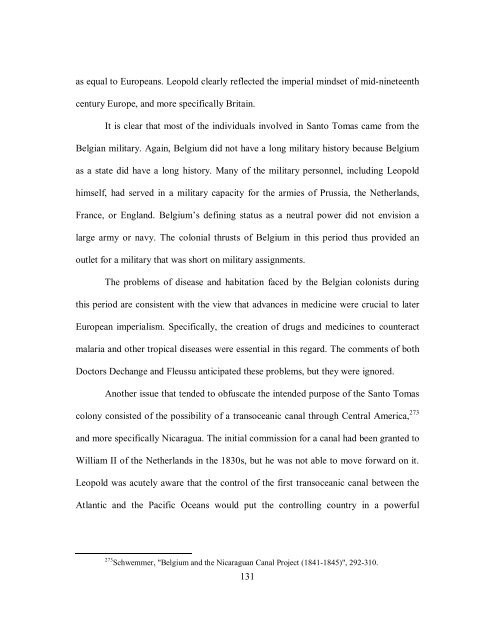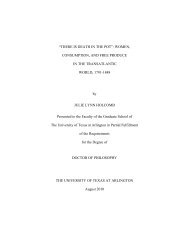EARLY BELGIAN COLONIAL EFFORTS - The University of Texas at ...
EARLY BELGIAN COLONIAL EFFORTS - The University of Texas at ...
EARLY BELGIAN COLONIAL EFFORTS - The University of Texas at ...
Create successful ePaper yourself
Turn your PDF publications into a flip-book with our unique Google optimized e-Paper software.
as equal to Europeans. Leopold clearly reflected the imperial mindset <strong>of</strong> mid-nineteenth<br />
century Europe, and more specifically Britain.<br />
It is clear th<strong>at</strong> most <strong>of</strong> the individuals involved in Santo Tomas came from the<br />
Belgian military. Again, Belgium did not have a long military history because Belgium<br />
as a st<strong>at</strong>e did have a long history. Many <strong>of</strong> the military personnel, including Leopold<br />
himself, had served in a military capacity for the armies <strong>of</strong> Prussia, the Netherlands,<br />
France, or England. Belgium’s defining st<strong>at</strong>us as a neutral power did not envision a<br />
large army or navy. <strong>The</strong> colonial thrusts <strong>of</strong> Belgium in this period thus provided an<br />
outlet for a military th<strong>at</strong> was short on military assignments.<br />
<strong>The</strong> problems <strong>of</strong> disease and habit<strong>at</strong>ion faced by the Belgian colonists during<br />
this period are consistent with the view th<strong>at</strong> advances in medicine were crucial to l<strong>at</strong>er<br />
European imperialism. Specifically, the cre<strong>at</strong>ion <strong>of</strong> drugs and medicines to counteract<br />
malaria and other tropical diseases were essential in this regard. <strong>The</strong> comments <strong>of</strong> both<br />
Doctors Dechange and Fleussu anticip<strong>at</strong>ed these problems, but they were ignored.<br />
Another issue th<strong>at</strong> tended to obfusc<strong>at</strong>e the intended purpose <strong>of</strong> the Santo Tomas<br />
colony consisted <strong>of</strong> the possibility <strong>of</strong> a transoceanic canal through Central America, 273<br />
and more specifically Nicaragua. <strong>The</strong> initial commission for a canal had been granted to<br />
William II <strong>of</strong> the Netherlands in the 1830s, but he was not able to move forward on it.<br />
Leopold was acutely aware th<strong>at</strong> the control <strong>of</strong> the first transoceanic canal between the<br />
Atlantic and the Pacific Oceans would put the controlling country in a powerful<br />
273 Schwemmer, "Belgium and the Nicaraguan Canal Project (1841-1845)", 292-310.<br />
131
















